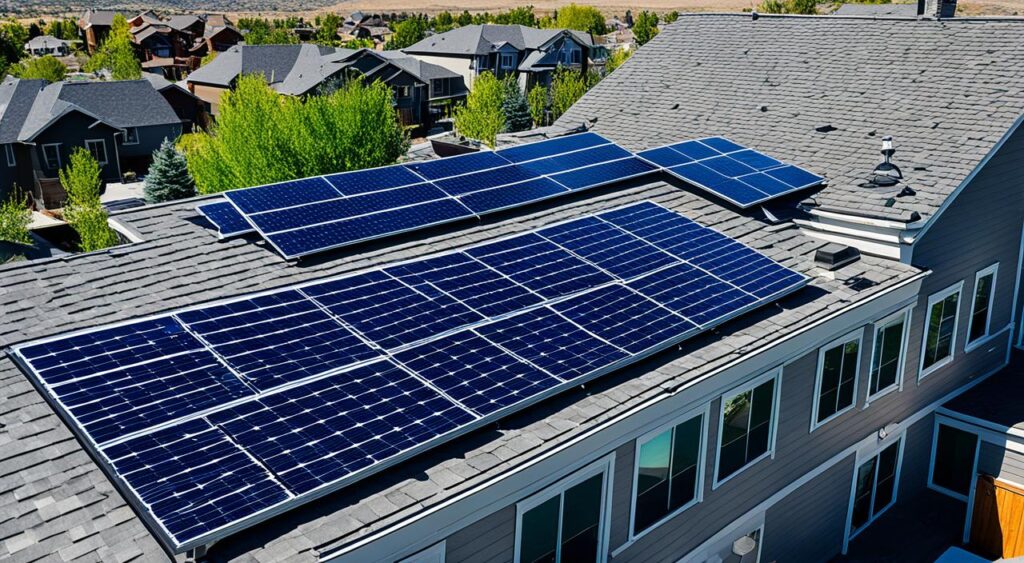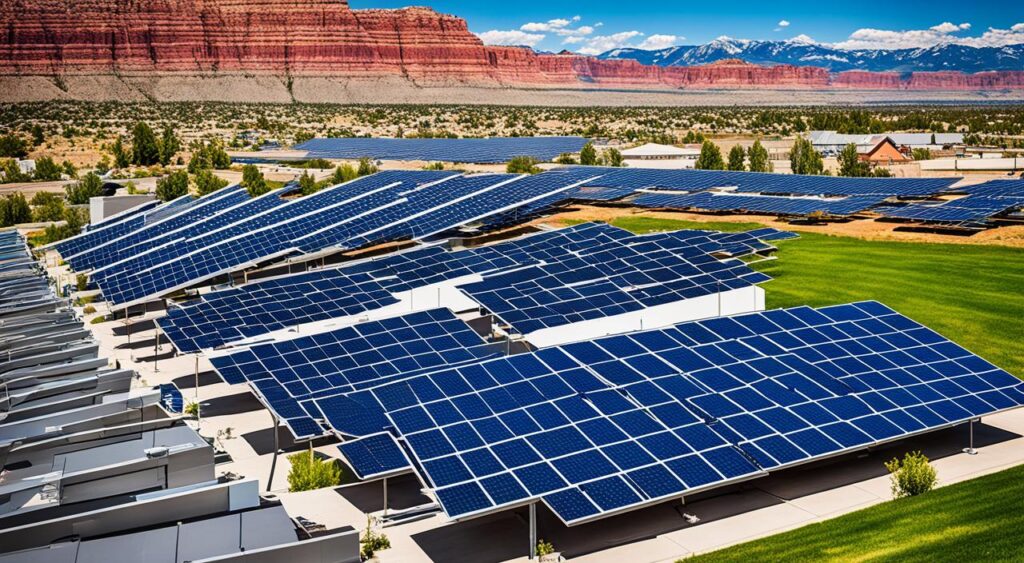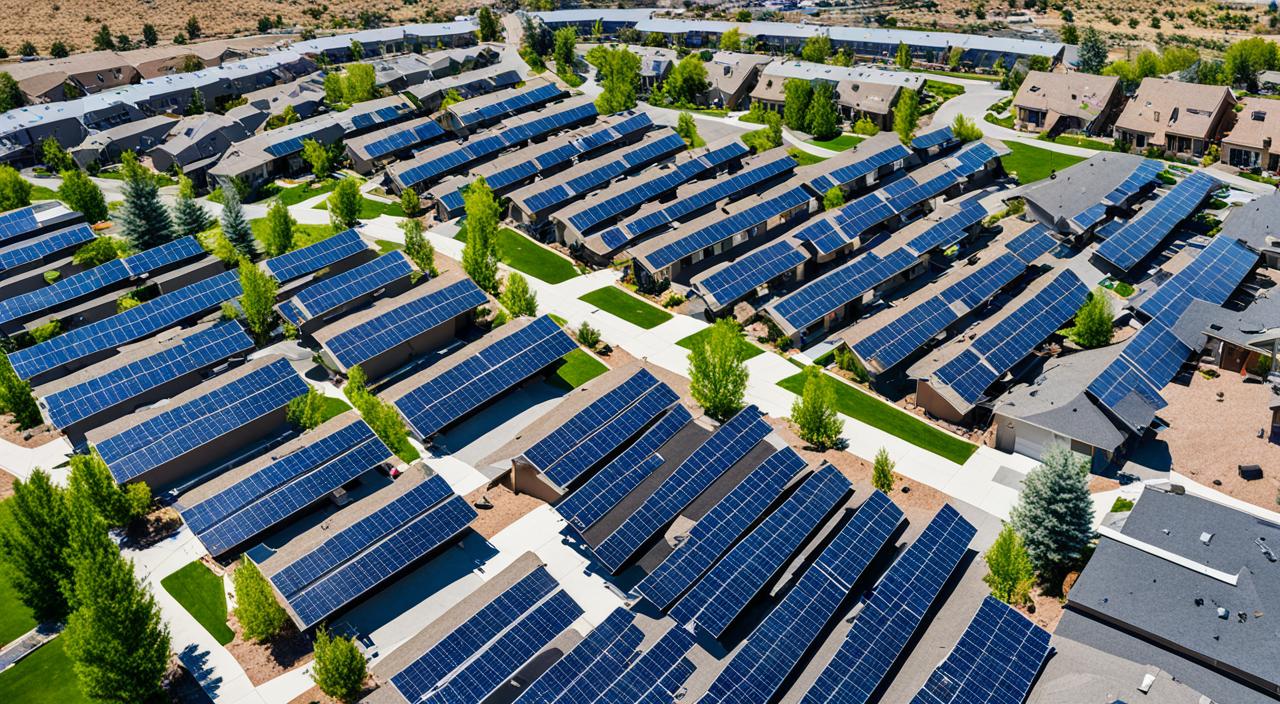Solar Panel Cost in Utah
More and more people in Utah are choosing solar power for their energy needs. This guide looks at the costs of solar panels in Utah. We’ll talk about what affects prices, how to finance them, and the benefits of solar energy. If you’re thinking about solar for your home or business, this article has the info you need.
Key Takeaways
- Solar panel costs in Utah vary depending on factors such as system size, location, and available incentives.
- Residential solar systems in Utah typically range from $10,000 to $25,000, while commercial systems can cost $50,000 or more.
- Financing options, including solar loans and leasing programs, can help make solar power more accessible to Utah homeowners and businesses.
- Utility rebates and federal tax credits can significantly reduce the upfront cost of a solar installation in Utah.
- Going solar in Utah can provide long-term savings on energy bills and increase the value of your property.
Understanding Solar Panel Costs in Utah
Installing solar panels in Utah has many factors that affect the cost. These include the price of the equipment, labor, and permits. Knowing these details helps homeowners and businesses make smart choices about solar energy.
Factors Affecting Solar Panel Pricing
The cost of solar panels in Utah depends on several things:
- Equipment: The quality of solar panels, inverters, and other hardware affects the price.
- Labor: The installation’s complexity and the solar contractor’s skills can change labor costs.
- Permitting and Inspection Fees: Local rules and permits add to the total cost.
- Site Conditions: The difficulty of the installation site, like roof angles and shading, can affect the price.
Average Costs for Residential and Commercial Systems
The average cost for a home solar system in Utah is between $10,000 to $15,000. This includes federal tax credits and other incentives. Commercial solar setups can cost more, ranging from $50,000 to $250,000. This depends on the system size and the business’s energy needs.
| System Type | Average Cost (Before Incentives) | Average Cost (After Incentives) |
|---|---|---|
| Residential Solar | $15,000 – $25,000 | $10,000 – $15,000 |
| Commercial Solar | $80,000 – $400,000 | $50,000 – $250,000 |
These prices can change based on each project’s specific needs. But they give a good idea of what to expect for solar panel costs in Utah.
Solar Panel Cost Utah: Breaking Down the Expenses
Installing solar power systems in Utah has its costs. We’ll look at each part to understand the solar panel cost utah better.
The main cost is the solar panels. Prices change with size, efficiency, and quality. Better panels cost more. Inverters also add to the cost, as they turn solar energy into electricity.
Racking, which holds the panels up, is another big expense. The choice of racking affects the price. Plus, the cost of installation matters, as experts are needed for a safe setup.
| Cost Component | Average Cost (Residential) | Average Cost (Commercial) |
|---|---|---|
| Solar Panels | $3.50 – $4.50 per watt | $2.75 – $3.75 per watt |
| Inverters | $0.50 – $1.00 per watt | $0.40 – $0.80 per watt |
| Racking | $0.25 – $0.75 per watt | $0.20 – $0.60 per watt |
| Labor | $0.50 – $1.00 per watt | $0.40 – $0.80 per watt |
These costs give a basic idea of what you might pay for residential solar panels utah or commercial solar utah. But remember, the final price can change based on your specific needs and location.

By looking at each cost part, we can understand the total cost better. This helps us make smart choices when investing in solar power for our homes or businesses in Utah.
Financing Options for Solar Panels in Utah
Investing in solar energy can be a big step, but Utah makes it easier with various financing options. Homeowners and businesses can choose from solar loans, leasing, rebates, and tax credits. These options help make solar panels more affordable and save you money.
Solar Loans and Leasing Programs
Solar loans are a popular choice in Utah. They let you buy the solar system and pay back with low-interest rates and flexible terms. Or, you can lease the system from a third-party company. You’ll pay a monthly fee for the electricity you use.
Utility Rebates and Tax Credits
Utah also offers incentives to help with the cost of solar panels. Local utilities give rebates or payments based on how well the system works. The federal government offers tax credits that can cut your costs even more. Make sure to look into solar incentives utah and solar rebates utah to save more.
| Financing Option | Description | Potential Savings |
|---|---|---|
| Solar Loans | Allows you to purchase the solar system outright with low-interest financing | Up to 30% of the system cost through solar tax credits utah |
| Solar Leasing | A third-party owns and maintains the system, you pay a monthly fee for the electricity | Minimal upfront costs, potential for long-term savings on energy bills |
| Utility Rebates | Many local utilities in Utah offer rebates or performance payments for solar installations | Varies by utility, but can range from $0.20 to $0.50 per watt installed |
| Federal Tax Credits | The federal government offers a tax credit of up to 30% of the system cost | Up to 30% of the total system cost |
Using these solar financing options utah, you can make solar energy more affordable. This means saving money on your bills and helping the environment.
Maximizing Your Solar Investment in Utah
When looking at residential or commercial solar panels in Utah, picking the right system size is key. It’s important to understand your energy needs to make a smart choice. Solar systems are tailored to your home or business’s unique energy use.
Evaluating System Size and Energy Needs
Getting the most from your solar investment means looking at your energy use now and in the future. Here are some important points to think about:
- Your average monthly electricity usage: Look at your past bills to see how much energy you use.
- The size of your property: How much roof or land you have will limit your solar panel system size.
- Your energy efficiency goals: Do you want to cut down on energy use or go for zero energy?
- Potential future energy needs: Think about any changes in your home or business that might affect your energy use.
By considering these factors, you can work with your solar installer. Together, you can create a system that fits your needs and boosts your investment.
| Residential Solar | Commercial Solar |
|---|---|
| Average system size: 3-8 kW | Average system size: 10-500 kW |
| Typical energy offset: 50-100% | Typical energy offset: 20-100% |
| Common applications: Homes, townhouses, small businesses | Common applications: Offices, warehouses, manufacturing facilities, retail stores |

“Investing in the right solar power systems utah for your needs is the key to maximizing the long-term benefits of going solar.”
The Long-Term Benefits of Going Solar in Utah
Investing in solar energy prices utah brings big benefits for homeowners and businesses in Utah. By using the sun’s power, people can lower their electricity bills, increase their property values, and help the environment. These benefits last for many years.
One key perk of solar power systems utah is saving money on monthly energy costs. Solar panels make clean, renewable electricity. This can cut down your traditional power use, leading to lower bills and more stable energy costs.
Also, homes with solar financing options utah often see their values go up. This makes solar a smart choice for homeowners wanting to increase their property’s worth. This boost can be a big plus when selling or refinancing your home.
Going solar in Utah also helps the environment. It cuts down on fossil fuel use, making your community and the planet cleaner. This green choice can make homeowners and business owners proud and happy.
Looking at the long-term savings, higher property values, and environmental benefits, choosing solar energy prices utah is a wise move for Utah folks. By looking into the different solar financing options utah, you can find the best fit for your budget. This leads to a more sustainable and financially rewarding future.
Choosing the Right Solar Installer in Utah
Choosing the right solar installer in Utah is key for a successful and cost-effective solar project. Whether it’s for your home or business, make sure to check the qualifications of potential contractors. This ensures they have what it takes for a good installation.
Qualifications and Certifications to Look For
When looking at solar installers in Utah, keep these points in mind:
- Licensed and insured: Make sure the installer is allowed to work in Utah and has insurance to protect your project.
- Certified by the North American Board of Certified Energy Practitioners (NABCEP): This certification shows the installer knows how to design, install, and maintain solar systems.
- Experience with solar panel cost utah, photovoltaic system installation utah, and commercial solar utah: Choose an installer with a good history of projects in your area.
- Positive customer reviews: Look at online reviews and testimonials to see how satisfied customers are and how the installer responds to them.
Working with a skilled and trusted solar installer in Utah means your solar panel cost utah, photovoltaic system installation utah, or commercial solar utah project will be done right. This ensures you get the most out of your solar investment over time.
“Choosing the right solar installer can make all the difference in the success of your solar project. Take the time to research and vet potential contractors to ensure they have the expertise and qualifications to deliver a high-quality installation.” – [Expert Solar Consultant]
Solar Panel Cost Utah: Trends and Projections
Understanding the trends and future of solar panel costs in Utah is key. We look at market changes, tech improvements, and policy shifts that could affect solar costs in the state.
In the last ten years, solar energy prices utah have dropped a lot. This makes solar more appealing for homes and businesses. The drop is thanks to better photovoltaic system installation utah tech, cheaper manufacturing, and bigger production.
Also, solar power systems utah are affected by government support. Tax credits, rebates, and net metering make solar cheaper for more people.
“The future of solar energy in Utah looks bright, with continued cost reductions and policy support expected to drive further adoption of this clean, renewable power source.”
Predicting solar panel prices in Utah is hard, but experts think costs will keep falling. This makes solar a better choice for more people. As solar tech gets better and the market grows, we’ll see more solar energy prices utah, photovoltaic system installation utah, and solar power systems utah in Utah.
Knowing about these trends helps Utah folks and businesses make smart solar investment choices. This way, they can enjoy the long-term perks of renewable energy.
Comparing Solar Panel Options for Utah Homes and Businesses
Exploring solar energy in Utah reveals many solar panel options for homes and businesses. Each type has unique features and costs. This knowledge helps you choose the best option for your energy needs and budget.
Residential Solar Panels in Utah
Homeowners in Utah often pick monocrystalline or polycrystalline silicon panels. Monocrystalline panels are efficient and look sleek, making them popular for residential solar panels utah setups. Polycrystalline panels are cheaper but still reliable.
Commercial Solar Solutions in Utah
Businesses in Utah have more solar panel choices, like thin-film and high-efficiency modules. Thin-film panels are great for big commercial rooftops, offering a budget-friendly option for commercial solar utah projects. High-efficiency modules cost more but produce more energy, saving money over time.
Financing Solar in Utah
Home and business owners can find many solar financing options utah to make solar energy easier to get. Solar loans, leases, and Power Purchase Agreements (PPAs reduce upfront costs. Tax credits and utility rebates add to the savings of going solar.
| Solar Panel Type | Efficiency | Typical Cost (per watt) | Best Suited For |
|---|---|---|---|
| Monocrystalline | High (18-22%) | $3.50 – $4.50 | Residential homes |
| Polycrystalline | Moderate (15-17%) | $2.50 – $3.50 | Residential homes |
| Thin-Film | Lower (10-14%) | $2.00 – $3.00 | Commercial rooftops |
| High-Efficiency Modules | High (20-22%) | $4.00 – $5.00 | Commercial properties |
Understanding Utah’s solar panel options helps you choose the right one for your needs, budget, and goals. Whether for a home or business, the right solar solution saves money and helps the environment.
Conclusion
Understanding the cost of solar panels in Utah is key for those thinking about renewable energy. We’ve looked at what affects prices, financing options, and the benefits of solar power. Now, you should feel ready to decide on solar for your property.
This guide showed the need to check your energy use, look into rebates and tax credits, and pick a good solar installer. Doing so makes the switch to solar panels easier and cheaper. It’s a great way to cut down on your carbon footprint, lower your bills, and enjoy the financial benefits of solar energy.
With more people in Utah wanting renewable energy, it’s a good time to look into solar. Getting a solar panel system helps Utah move towards clean energy. It also means lower energy costs and a more reliable power supply for you. Let’s use Utah’s sun to make a positive change for our environment and communities.

